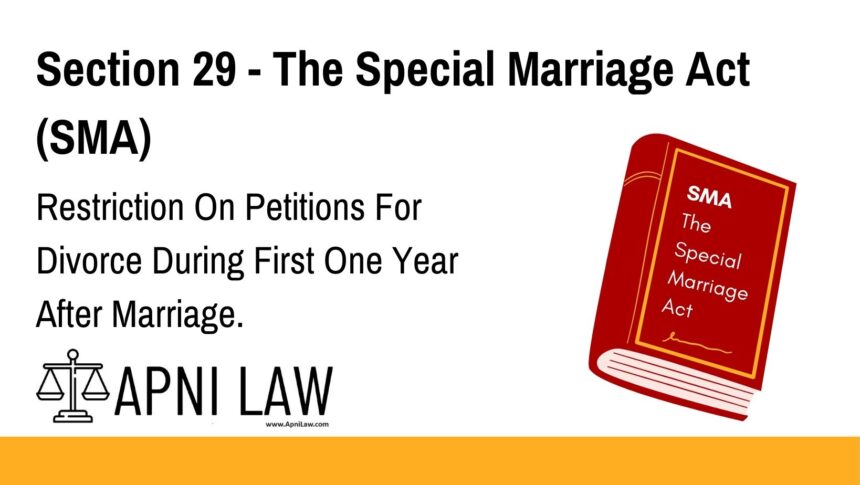Code: Section 29 of the Special Marriage Act, 1954
29. Restriction on Petitions for Divorce During First One Year After Marriage.
(1) No petition for divorce shall be presented to the district court unless at the date of the presentation of the petition one year has passed since the date of entering the certificate of marriage in the Marriage Certificate Book:
Provided that the district court may, upon application being made to it, allow a petition to be presented before one year has passed on the ground that the case is one of exceptional hardship suffered by the petitioner or of exceptional depravity on the part of the respondent, but if it appears to the district court at the hearing of the petition that the petitioner obtained leave to present the petition by any misrepresentation or concealment of the nature of the case, the district court may, if it pronounces a decree, do so subject to the condition that the decree shall not have effect until after the expiry of one year from the date of the marriage or may dismiss the petition, without prejudice to any petition, which may be brought after the expiration of the said one year upon the same, or substantially the same, facts as those proved in support of the petition so dismissed.
(2) In disposing of any application under this section for leave to present a petition for divorce before the expiration of one year from the date of the marriage, the district court shall have regard to the interests of any children of the marriage, and to the question whether there is a reasonable probability of a reconciliation between the parties before the expiration of one year.
Explanation of Section 29 – Restriction on Petitions for Divorce During the First One Year After Marriage
Section 29 of the Special Marriage Act imposes a waiting period of one year after the marriage before a petition for divorce can be filed in court. This provision is aimed at encouraging reconciliation between the couple and preventing hasty decisions during the early stages of marriage. Below is a breakdown of the key provisions:
Key Features of Section 29:
- One-Year Waiting Period:
A petition for divorce cannot be filed within the first year of marriage. The date on which the marriage certificate is entered in the Marriage Certificate Book is crucial in determining this one-year period. - Exceptions for Early Petition:
The district court may grant permission for a divorce petition before the one-year period if:- Exceptional Hardship: The petitioner is facing exceptional hardship.
- Exceptional Depravity: The respondent has engaged in extreme misconduct or depravity.
- Misrepresentation:
If the petitioner misrepresents the case or conceals facts to obtain early permission, the court may dismiss the petition or delay the decree until after the one-year period. - Consideration of Children:
The district court will take into account the interests of any children from the marriage when considering early divorce petitions and will assess whether there is a possibility of reconciliation between the parties.
Illustration
Example 1: Request for Divorce Before One Year Due to Exceptional Hardship
A woman has been facing extreme physical and emotional abuse from her husband just months after marriage. Due to the hardship, she seeks permission from the district court to file for divorce before the one-year period. The court reviews the case and grants the petition, acknowledging the exceptional hardship.
Example 2: Petition Dismissed for Misrepresentation
A man files for divorce before completing the one-year period, claiming that he was facing exceptional deprivation. However, upon hearing the case, the court discovers that the petitioner misrepresented the facts. The court dismisses the petition and sets the condition that any future petition must be filed after one year.
Common Questions and Answers on Section 29
1. Can I file for divorce in the first year of marriage?
No, a petition for divorce cannot be filed within the first year after marriage unless the court grants permission due to exceptional hardship or exceptional depravity.
2. Under what circumstances can a divorce petition be filed before one year?
The district court may allow a petition before the one-year period if the petitioner is facing significant hardship or if the respondent has committed egregious acts like cruelty or misconduct.
3. What happens if the court grants permission for early filing?
If the court grants permission, it may allow the petition to be filed, but it could also delay the effect of the divorce decree until after the one-year period, depending on the case.
4. Can I withdraw my petition if the court does not grant early filing?
Yes, if the petition is not allowed to be filed within the first year, the case can be re-filed after the one-year waiting period.
5. Will the court consider the children of the marriage in deciding the early filing request?
Yes, the court will consider the interests of any children involved and assess whether there is a possibility of reconciliation before the one-year waiting period.
Conclusion
Section 29 of the Special Marriage Act places a restriction on divorce petitions within the first year of marriage, ensuring that couples have an opportunity to reconcile. However, in cases of exceptional hardship or severe misconduct, the district court may allow early filing of divorce petitions.
Understanding this waiting period and the exceptions helps in making an informed decision when considering a divorce. If you are facing challenges in your marriage and considering legal options, it is advisable to consult a family lawyer to guide you through the process.
For more information on divorce and marriage laws, visit ApniLaw.








